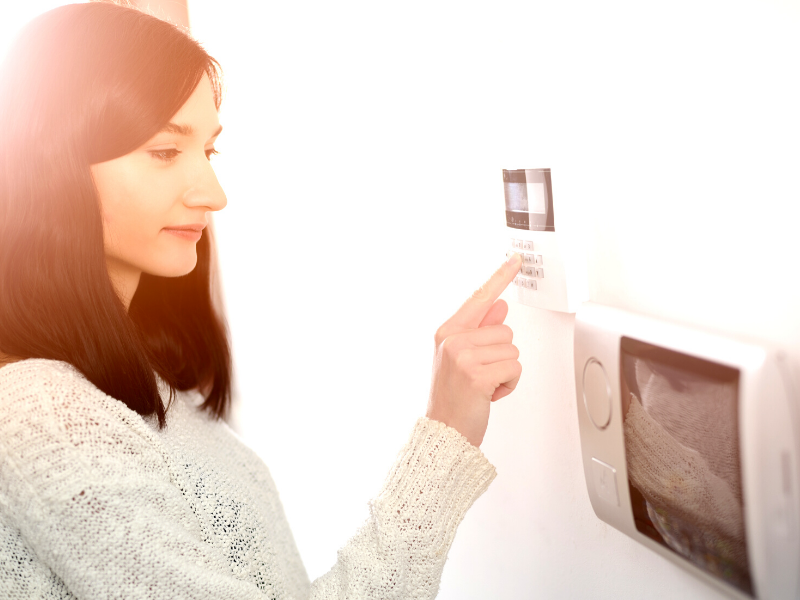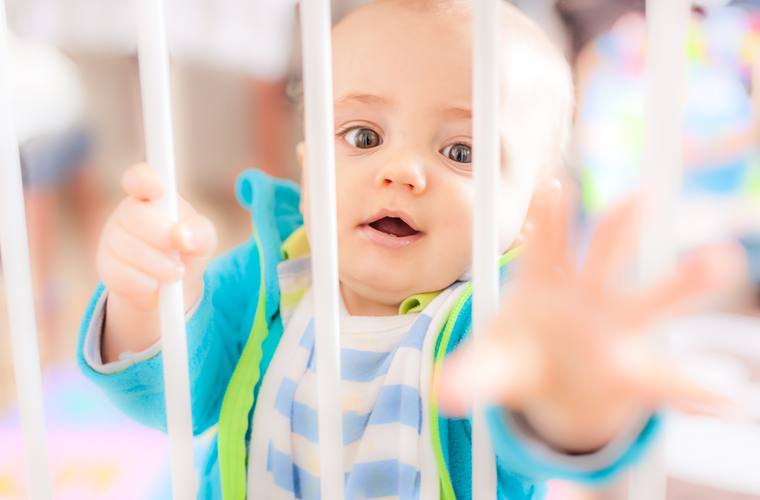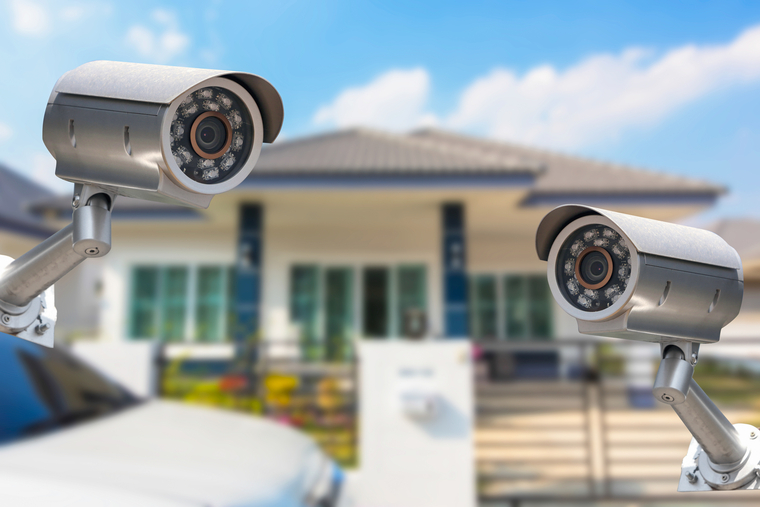Staying Safe When Selling Your Home


Image Source: Canva
Staying organized while uprooting your life and moving from one home to another can feel impossible. There’s also the pressure to keep your home clean and tidy for showings to prospective buyers, but your personal safety is an important consideration as well.
When selling your home, there will be strangers entering your space, so it’s important for you and your agent to take certain safety precautions. Like so many things in life, they can feel more manageable once written down, so we made this handy checklist.
Prepare your home:
- Go through your medicine cabinets and remove all prescription medications.
- Remove or lock up precious belongings and personal information. You will want to store your jewelry, family heirlooms, and personal/financial information in a secure location to keep them from getting misplaced or stolen.
- Remove family photos. We recommend removing your family photos during the staging process so potential buyers can see themselves living in the home. It’s also a good way to protect your privacy.
- Check that your windows and doors are secure before and after showings. If someone is looking to get back into your home following a showing or an open house, they will look for weak locks or they might unlock a window or door.
- Consider extra security measures such as an alarm system or other monitoring tools like cameras.
- Don’t show your own home! If someone you don’t know walks up to your home asking for a showing, don’t let them in. You always want to have an agent present to show your home.
Talk to your agent about the following safety precautions:
- Do a walk-through with your agent to make sure you have identified everything that needs to be removed or secured, such as medications, belongings, and photos.
- Go over your agent’s screening process so you are both on the same page about phone screening, and how to qualify buyers before showings, as well as personal safety tactics during showings and open houses.
- Lockboxes to secure your keys for showings should be up to date. Electronic lockboxes track who has had access to your home.
- Go through your home’s entrances and exits and share important household information so your agent can advise how to secure your property while it’s on the market.
Childproofing: Protect Your Family and Your Home from Potential Hazards

Posted in Living by Shelley Rossi

When you think of your home, it likely conjures up feelings of safety, shelter, and comfort. However, accidental injuries in the home are one of the leading causes of harm to children 14 and younger. By taking certain precautions, many of these accidents can be prevented.
While supervision is the best way to keep your children safe at home, you can’t watch them every second. Childproofing, to whatever degree you are comfortable, will go a long way toward keeping your littlest loved ones safe and healthy at home.
Here are some tips to get you started.
Many accidents happen with or around water.
If you have children at home, it’s advisable to adjust your water heater to no higher than 120 degrees to prevent scalding. Furthermore, you should never leave a small child unattended in a bath tub, even for a few seconds. And be sure to safely secure doors that lead to swimming pools and hot tubs, including pet doors. When cooking or boiling water, turn pot handles in, or better yet use the back burners, to prevent little hands from pulling them off the stove.
Household chemicals can be very harmful to children.
It’s important not to keep poisonous materials under the sink, even if you have a cabinet guard in place. Keep dangerous chemicals up high and in a room that isn’t accessible to your little ones. Seemingly innocuous medicines can also be dangerous. Make sure your medicine cabinet is out of sight, mind, and reach.
Use safety latches and gates.
It’s advisable that you use safety latches on drawers, cabinets, toilets, and windows, as well as place covers on all electrical outlets. Gate off stairways and entrances to rooms, such as garages, that contain dangerous or fragile objects.
Secure furniture and other objects.
Heavy furniture, electronics, and lamps must be secured to prevent a child from pulling them over. Bookshelves and entertainment centers often come with devices that attach them to walls so that a climbing child won’t topple the furniture. The end-caps on door stoppers can be a choking hazard, so it’s advisable to remove them. Place plastic bumpers on sharp corners or edges of coffee tables, entertainment centers, and other furniture to prevent cuts and bruises.
Install a carbon monoxide detector.
The U.S. Consumer Product Safety Commission (CPSC) recommends that consumers purchase and install carbon monoxide detectors in addition to smoke alarms. Be sure to test both devices regularly and replace batteries as needed. The American Red Cross advises families to learn first aid and CPR, and to devise an emergency evacuation plan for fires and earthquakes.
Emergency contact info.
Last, but not least, in case an emergency does happen, always keep numbers for your child’s doctor, your work and cell, and other emergency contact info in an easily found place, preferably near the phone.
Accidents can and will happen, but by following a few small steps you can have peace of mind knowing that you’ve done everything you can to protect your family from harm in your home.
Selling Your Home? Go Through This Safety Checklist With Your Real Estate Agent


Selling your home can be stressful for many reasons. Not only are you trying to get the best financial return on your investment, but you might also be working on a tight deadline. There’s also the pressure to keep your home clean and organized at all times for prospective buyers. One thing you can be sure of when selling your home is that there will be strangers entering your space, so it’s important for you and your agent to take certain safety precautions.
- Go through your medicine cabinets and remove all prescription medications.
- Remove or lock up precious belongings and personal information. You will want to store your jewelry, family heirlooms, and personal/financial information in a secure location to keep them from getting displaced or stolen.
- Remove family photos. We recommend removing your family photos during the staging process so potential buyers can see themselves living in the home. It’s also a good way to protect your privacy.
- Check your windows and doors for secure closings before and after showings. If someone is looking to get back into your home following a showing or an open house, they will look for weak locks or they might unlock a window or door.
- Consider extra security measures such as an alarm system or other monitoring tools like cameras.
- Don’t show your own home! If someone you don’t know walks up to your home asking for a showing, don’t let them in. You want to have an agent present to show your home at all times. Agents should have screening precautions to keep you and them safe from potential danger.
Talk to your agent about the following safety precautions:
- Do a walk-through with your agent to make sure you have identified everything that needs to be removed or secured, such as medications, belongings, and photos.
- Go over your agent’s screening process:
- Phone screening prior to showing the home
- Process for identifying and qualifying buyers for showings
- Their personal safety during showings and open houses
- Lock boxes to secure your keys for showings should be up to date. Electronic lockboxes actually track who has had access to your home.
- Work with your agent on an open house checklist:
- Do they collect contact information of everyone entering the home?
- Do they work with a partner to ensure their personal safety?
- Go through your home’s entrances and exits and share important household information so your agent can advise how to secure your property while it’s on the market.
Your safety, as well as that of your agent and your home, is of paramount importance when selling a property. For more information, visit:
http://www.mercurynews.com/los-gatos/ci_26509084/realtors-issue-safety-tips-folks-who-are-selling
 Facebook
Facebook
 Twitter
Twitter
 Pinterest
Pinterest
 Copy Link
Copy Link